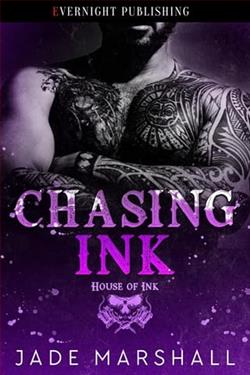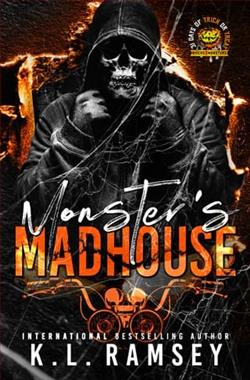Page 53 of Cold as Hell
But that wouldn’t be cause for concern. It’s expected behavior.
Dalton points again. “They missed a spot here. It’s lightly covered, but I can still see impressions.”
“Boot prints?” I ask, and then I see what he means, whichis far too high on the snow to be boots. It’s two impressions in the snow, less than a foot wide, just over a foot long, almost forming a V before they reach the log.
I scan the log. Then I reach out and pull a trapped fiber from the bark, and I know for certain what I’m seeing.
Those impressions are from thighs. From someone sitting on this fallen tree.
Sitting here… and watching Lynn staked out on her back and naked, as she slowly died of exposure.
CHAPTER SEVENTEEN
We stay at that site until even our flashlights aren’t enough to illuminate properly, and when we do need to leave, I try not to grind my teeth in frustration. I have a new theory, which means a new way of looking at the scene.
That frustration is an excellent way to displace the horror of my new theory. Don’t think too much about it. Focus on the crime, not what occurred here to a living person. To a person I knew…bya person I know.
Pregnancy has been an emotional roller coaster for me. I’ve blamed the hormones, but I think, in some way, those hormones have only eroded long-erected walls. In my family, I was “the emotional one.” Is it possible, even in a moderately functional family, for that to be a good thing? For a child to be told they’re emotional or sensitive, and not hear it as a criticism? Being emotional or sensitive is considered a feminine quality. If you’re a boy, that’s bad. Even if you’re a girl, coached to be strong and independent, it’s bad.
I learned to box up those parts of myself, and now hormoneshave exploded those boxes. I cry easily. I get angry and frustrated more easily. But I’m also quicker to hug Dalton or tell him how much I appreciate him. I’m quicker to show affection and gratitude with everyone in my life.
Going forward, I’d like to stanch the tears and dowse the anger and control the frustration but retain that ability to show people that I love and value them. And if it’s not possible to have all that, then maybe keeping the tears and the rage isn’t entirely a bad thing.
Right now, though, I can’t use the rage or the tears. I need to set them aside or I’ll get caught up in the horror of what Lynn endured.
Once I had my theory, I was able to find more evidence to fit it. More fibers on that log. More marks in the snow where Lynn had lain. Marks that do nothing to keep the horror from seeping in, because they do not indicate a woman who’d been drugged senseless and died without regaining consciousness.
Stripped naked. Staked out on the ice. Screaming for help that would never come. Dying slowly and horribly… as her killer sat there and watched.
I might manage to process that scene. But I do not manage to squelch my horror or my rage.
Not for a second.
We’re back at the clinic with more questions for April. She’s run the tox screen, and it’s inconclusive. Was Lynn drugged and led out there, waking only after she’d been staked out? Or did Lynn trust her killer and let them lead her onto the ice before she realized they weren’t taking her home?
I’d expect to see signs of a fight once she understood shewas in trouble, but that’s as wrong as assuming rape will always show physical trauma. She could have stripped willingly, certain if she just listened to her captor, he’d get it over with and she’d be released. But I can’t say—even knowing what I do—that I wouldn’t feel the tug of that solution.
Be a good girl. Do as you’re told, and this will all be over soon.
April does another, even more thorough check for sexual activity, but still finds none, and I don’t think she will. We made a mistake with Kendra. An understandable mistake. A woman was drugged in a bar and dragged into the woods. That means sexual assault, right? Usually, yes. But it could also mean that Kendra avoided Lynn’s fate.
Someone wants to commit a horrible murder. To watch someone die of hypothermia. They put drugs into one drink of a tray going to three women. Russian roulette. Whoever gets the dosed drink dies. That fails, but then a storm allows them to lead a different woman out of town the next night.
One new question for April is whether there’s any sign that Lynn was gagged. There isn’t, which takes this to another level of cruelty and confidence.
Whoever killed Lynn knew that if anyone heard her screams, it’d be mistaken for the wind. Was that even more exciting for them? Knowing someone might later realize they’d heard Lynn screaming for help and ignored it?
Leaving her free to scream might also have kept her from fighting as hard as she could. After all, town wasright there.Surely someone would hear. Someone would come.
While it’s possible she was gagged and it left no physical evidence, I don’t think she was.
And that tells me a lot about the person I’m hunting.
I know what I need to do next, and I am physically, mentally, and emotionally incapable of doing it. That is excruciating for me to admit. I always thought motherhood would mean I’d need to be tougher, stronger, even more capable and independent than I already am, but I’m coming to wonder whether it’s going to require me to change in even more difficult ways. To become softer, letting those emotions in, and to be able to recognize my own limits and accept help. Evenaskfor help.
I do that today. I’m exhausted, and every ounce of energy I have left has been diverted to sorting out all the implications of what has happened. I need to find someplace dark and quiet so I can think. Yet someone also needs to tell Lynn’s husband that his wife is dead. So I ask Dalton to do that for me.
I hate giving him an ugly task, and I hate surrendering a vital interview. Who is the person most likely to have murdered Lynn? Her husband, and that has nothing to do with the state of their marriage. It’s pure statistics.















